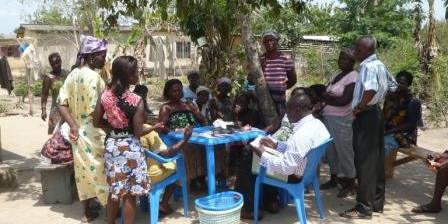
December 4, 2012, by ICCSR
Microfinance: Up Close and Personal
Capital One recently invited members of the ICCSR Team to join them at a breakfast seminar with Muhammad Yunus, Bangladeshi banker, economist and Nobel Peace Prize winner. To tie in with this event ICCSR students were asked to write short reflections on microcredit and the best submissions were invited to attend the seminar. Mei-ing’s submission was judged to be the runner-up and her entry is reproduced below (also see the winner).
————————-
Microfinance: Up Close and Personal
Afia Boma led me to her shop – a small, wooden hut – where she worked as a seamstress. Not too long ago, her work was limited to mending clothes for people in her village. Then, with other women from her village, she obtained a small loan from CRAN (the Christian Rural Aid Network, a local microfinance institute in Ghana), which allowed her to purchase fabric to make new clothes for sale. She took me to the back of her room and showed me her prize: a refrigerator she had recently purchased with her earnings. She opened the fridge and the entire door came off. I stifled a gasp, but she beamed at me proudly – to her, it was brand new. It was a humbling moment. This little appliance, which most of us would have discarded ages ago, was for her newest line of business: cold drinks for thirsty Ghanaian villagers.
Another borrower, Ama Assaba, showed me the house she was building. This was particularly poignant because many women in rural Ghana don’t own their homes. The property deeds are usually in the names of their husbands. In the event the husband passes away, his relatives may lay claim to his property, leaving his widow and children without a roof over their heads. Ama wasn’t going to have any of that.
Microcredit has empowered many rural and semi-rural women in Ghana – and other parts of the world – by providing them with a much-needed opportunity to start a business or expand their existing ones. Many of them had previously borrowed from moneylenders at punitive rates, repaying them with most of their meagre earnings – an agonising vicious cycle.
Afia Boma and Ama Assaba were the first of many borrowers that I would meet during my stint as a Kiva Fellow (a volunteer representing Kiva, a micro-loan portal) in Cape Coast, Ghana. Having worked in financial services for several years with ‘affluent’ customers, it was a lot more fulfilling to see how basic financial education and access to micro credit could make such a profound impact on the lives of people at the other end of the spectrum, especially women.
Many MFIs, such as CRAN, have targeted their loans at women because they believe, fairly or unfairly, that the ‘trickle-down benefit’ from lending to women is greater than that of lending to men. In other words, if women are empowered economically, they are likely to attend to the needs of their children and the community, resulting in a multiplier effect.
With the ability to not only earn an income, but also save some of it, the borrowers I met, and many others like them, are now more financially secure and more confident. Some of them have purchased land to build their homes; yet more are building the futures of the next generation by sending their children to school. I do believe – passionately – that microfinance can truly empower women and that it is one of the key solutions to helping the working poor break out of the poverty trap.
By Mei-ing Cheok, student on the MSc in CSR programme at the ICCSR, Nottingham Univiersty Business School.
Image taken by Mei-ing.

[…] Capital One recently invited members of the ICCSR Team to join them at a breakfast seminar with Muhammad Yunus, Bangladeshi banker, economist and Nobel Peace Prize winner. To tie in with this event ICCSR students were asked to write short reflections on microcredit and the best submissions were invited to attend the seminar. Shakera’s submission was judged to be the winner and is reproduced below (also see the runner up). […]
Hey Mei-ing, thank you for posting this news. I am an alumnus of UoN and I am looking forward initiating a student society for microfinance promotion. It is fantastic that ICCSR could join Microcredit movement recently. Wish I can contribute more.
Best,
Wu WEI
There’s no question that microcredit works well in areas with no financial services infrastructure, but it is also a vital resource in countries with developed economies, such as the U.S. The Aspen Institute’s FIELD program estimates that there are approximately 20 million microentrepreneurs in the U.S., whose businesses contribute to 16.6 percent of total non-farm employment in the country. Over half of these entrepreneurs do not have access to bank financing. Microcredit offers them the opportunity to sustain and grow their businesses. A 2006 survey of clients with repaid microloans showed that gross monthly sales at businesses receiving microloans increased 64 percent, from an average of $5,921 before ACCION loans to $9,711 after ACCION loans. Business assets grew from $18,146 to $24,796.Microfinance is a proven poverty reduction strategy with the potential to become self-sustaining in the long term as clients pay back their loans, which nearly all do. And that’s as true in Miami as it is in Mali.